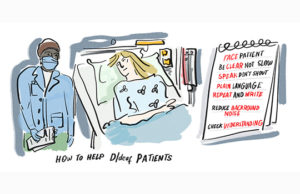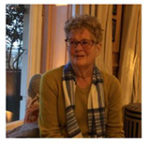 Devina Maru, a GP Speciality Registrar and RCGP National Clinical Champion for Deafness and hearing loss, and Jean Straus, a hearing aid user, discuss how covid-19 has engendered a sense of community amongst people with hearing loss and spurred innovation by individuals and the UK charities who support them.
Devina Maru, a GP Speciality Registrar and RCGP National Clinical Champion for Deafness and hearing loss, and Jean Straus, a hearing aid user, discuss how covid-19 has engendered a sense of community amongst people with hearing loss and spurred innovation by individuals and the UK charities who support them.
Devina: Covid-19 poses unique challenges to the 12 million people in the UK with hearing loss, many of whom rely on visual cues such as lip-reading and sign language, which leans heavily on facial cues and expressions for communication. [1] In response to the covid-19 pandemic, not all UK government briefings were accompanied by British Sign Language (BSL) interpreters and this provoked appreciable concern among the 151,000 people who are BSL users. [2]
The Equality Act requires reasonable adjustments to be made to support disabled people, including providing information in an accessible format. The Accessible Information Standard puts a legal requirement on all health and social care providers to identify communication needs and provide information in people’s preferred format. The government should provide and publicise comprehensive, timely public health information in BSL and ensure BSL interpretation for all daily televised covid-19 briefings and emergency announcements. As a result, a petition was put forward by the Deaf community. The recent response by the government explained that in accordance with Public Health Guidance it is not possible to safely include a physical BSL interpreter in the room for daily briefings, without potentially putting them and others at risk. However, BSL interpretation of the daily covid-19 briefings are now provided via the BBC News channel and iPlayer. [3]
In response to the needs of the Deaf community to have timely and accessible information, the UK’s D/deaf charities have mobilised swiftly. Charities such as the British Deaf Association, SignHealth and the Royal Association for Deaf people (RAD) are providing BSL versions of the Government’s briefings on coronavirus. SignHealth continues to provide Deaf mental health support to members of the community and have moved their service for helping victims of domestic abuse online during the pandemic. deafPLUS charity’s BSL advice line remains open and Action on Hearing Loss have set up a BSL information service to support Deaf people during the outbreak. Due to social distancing Enabled Living set up virtual drop in sessions for Deaf patients to access GP and Health Visitor appointments via video call, to address health concerns.
New innovations and free services for people with hearing loss
A great example of organisations coming together during covid-19 is BSL Health Access. [4] The service provides immediate, on-demand access to BSL interpreters for communication with Deaf people in all health settings, including pharmacy, opticians, general practice and dentists, free of charge during the current coronavirus situation. Access to BSL interpreters take place through two methods: Video Relay Services (VRS)—when a BSL interpreter relays information over a telephone call between a BSL user and the hearing person receiving or making the call; and Video Remote Interpreting (VRI)—where a remote interpreter is used to facilitate communication with a Deaf and hearing person in the same location.
Innovation in response to covid-19 has been notable. A student in the USA reminds us of the importance of compassion and not overlooking the unique needs of people as we respond to this challenging time. She created a mask that uses a clear panel to enable people to read lips and facial cues. [5] However, there are no transparent masks available for use in healthcare settings in the UK and these are not classified as suitable for use in a healthcare setting, where type IIR or FFP3 masks are required. The Government’s latest guidance advises wearing face coverings in enclosed spaces such as public transport, where social distancing may not be possible. Nine charities all joined in solidarity, led by the National Deaf Children’s Society and asked for future Government guidance on face coverings to include advice on speaking to deaf or deafblind people whilst wearing masks. They also wrote to Public Health England and NHS England asking them to commission transparent face masks.
A UK Doctor created digital flashcards which enable medical staff to ask critically ill or Deaf coronavirus patients questions and share vital information on digital flashcards displayed on a phone, tablet, or computer. [6] In just 72 hours it was used by NHS trusts and hospitals in 50 countries across the world. Cardmedic is currently available in 10 different languages and features a “read aloud” option to help those who are blind or too unwell to read. An app is in development which will include illustrations and videos for British Sign Language, as well as creating downloadable PDF versions for healthcare professionals to print, laminate, write on, wipe-off and reuse.
Personal protective equipment communication barriers, isolation and loneliness are challenges common to many patients, but the needs of those who rely solely on lip reading have been largely ignored. Two deaf doctors have recently written powerfully about their experience. [6] I have witnessed this myself, with my grandmother who wears bilateral hearing aids. She is in hospital currently and struggles to understand what the healthcare workers are saying beneath their face mask as she’s reliant on lip reading. This can be exhausting, especially with each new encounter, update or explanation.
Simple measures to aid patients with hearing loss who don’t use BSL and cannot use visual cues, such as on the telephone or when wearing PPE, include speaking clearly but not too slowly, and not loudly; checking understanding by asking the patient to repeat information back or rephrasing if the patient asks to repeat the information; using plain language; sticking clearly to the point and reducing background noise as much as possible. Using the written word, speech to text apps or digital flashcards are additional helpful aids.
Jean: As a person with hearing loss who doesn’t use British Sign Language, I have been delighted by the solidarity and support provided by charities and individuals speaking out. Patients and patient advocates have also come together to support each other via social media, sharing tips for hearing and coping during lockdown. Action on Hearing Loss information line has been useful in providing free, impartial information and emotional support during these difficult times. I have enjoyed reading Limping Chicken, the UK’s independently run deaf blog and news site. It has pieces full of humour, information, and solace. I have found the diaries of people explaining how they are coping, and practical tips on, for example, using zoom, or resources for captioning remote meetings really useful. The British Tinnitus Association are now running online tinnitus support groups for those who might be used to in- person meetings and want to chat.
The BBC provided its own support for helping people with their hearing loss during Deaf Awareness Week. Carly Sygrove, with one-sided deafness, wrote a blog about the challenges of wearing a mask, aptly entitled Behind the Face Mask. And charities advocating less noise such as Silencity and UK Noise Association @cutnoise have been promoting the advantages of a quieter world, all of which impact on those of us with hearing loss.
For me, living on my own, I have discovered some startling improvements to my life in these long days of lockdown. Although my tinnitus is louder (and others on social media are reporting the same) I am getting closer to being able to “hear” silence when I go outside, due to less traffic and plane noise. I can cycle with less fear, not just because there’s less traffic on the roads, but because it is easier to make out the sounds of individual vehicles. For the same reasons, birdsong is easier to hear which is a real benefit for those of us with hearing loss.
Those of us of a certain age are regularly told we must wear hearing aids and told to value social interaction for its stimulating benefits to our cognition. Alone at home, however, I am discovering a slight relief from not having to be constantly working to make out what people are saying. In fact, I’m wondering if the benefit of the added calmness I’m feeling could be offset against the benefit of regular spoken social interaction.
I’m really fortunate in the technology I am accessing. Watching more TV these days, I not only have captions on the screen, but also a device which streams the sound straight into my hearing aids. I use this device to stream zoom meetings and on the rare occasion when I interact with someone while socially distancing, I can hand them this microphone. Many people like me have been using the phone much more because it’s streamed to our hearing aids. I am aware that I am fortunate in having access to this technology and D/deaf charities are seeking to extend such technological advances to all.
Future directions
The covid-19 pandemic has fuelled a sense of community. The solidarity and innovations by UK D/deaf charities and individuals are contributing to better, and safer care. It is important that the learning from the pandemic with respect to D/deafness, as in other spheres, is not forgotten.
- D/deafness: You can find out more about the two separate spellings of the word “deaf” and self identification in the deaf community here.
 Devina Maru, GP Speciality Registrar and RCGP National Clinical Champion for Deafness and Hearing Loss. Devina has a seat on the Global Ototoxicity Committee for the Department of Defence Hearing Centre of Excellence Pharmaceutical Interventions of Hearing Loss Working Group. Twitter: @Devina_Maru
Devina Maru, GP Speciality Registrar and RCGP National Clinical Champion for Deafness and Hearing Loss. Devina has a seat on the Global Ototoxicity Committee for the Department of Defence Hearing Centre of Excellence Pharmaceutical Interventions of Hearing Loss Working Group. Twitter: @Devina_Maru
Competing interests: nothing to declare.
 Jean Straus is an advocate for patients with or without hearing loss. She writes a column for the Action on Hearing Loss Magazine and is an Associate of the Point of Care Foundation. Twitter: @JeanStraus
Jean Straus is an advocate for patients with or without hearing loss. She writes a column for the Action on Hearing Loss Magazine and is an Associate of the Point of Care Foundation. Twitter: @JeanStraus
Competing interests: nothing to declare.
References:
-
- Action on Hearing Loss. Facts and Figures. Available from URL: https://www.actiononhearingloss.org.uk/about-us/our-research-and-evidence/facts-and-figures/
- Government Digital Statistics. Statistics about hearing loss. Available from URL: https://www.gov.uk/government/publications/understanding-disabilities-and-impairments-user-profiles/saleem-profoundly-deaf-user
- UK Government and Parliament Petition – Require British Sign Language Interpreters for emergency announcements on TV. Available from URL: https://petition.parliament.uk/petitions/301461
- BSL Health Access. Available from URL: https://www.bslhealthaccess.co.uk/health-service-provider/ – changed to correct URL
- Forbes. This See-Through Mask Lets The Deaf Communicate While Staying Safe Available from URL: https://www.forbes.com/sites/marleycoyne/2020/04/04/this-see-through-mask-lets-the-deaf-communicate-while-staying-safe/#3819aec65257
- The Guardian. UK doctor invents digital flashcards to help Covid-19 patients understand staff. Available from URL:https://www.theguardian.com/world/2020/apr/25/uk-doctor-invents-digital-flashcards-to-help-covid-19-patients-understand-staff
